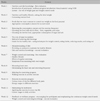Abstract
Purpose
This research was conducted to compare the effect of a wellness program on nutrition and diet knowledge, exercise and weight control knowledge, and weight control of schizophrenia patients.
Methods
A nonequivalent control group pretest-posttest design was used for this study. A total of 34 patients were randomly divided into the experimental group (17) and the control group (17). The experimental group received about 1 hour of a nutrition and diet knowledge intervention for 6 weeks and about 1 hour of an exercise and weight control knowledge intervention for another 6 weeks, while the control group received the usual care. The outcome variables were measured before and after the program. Data were analyzed by t-test using SPSS/WIN 14.0.
Figures and Tables
References
1. Anderson MB, Van Raalte JL, Brewer BW. Sport physiology service delivery. Professional Physiology. Res Pract. 2001; 32:12–18.
2. Blackburn GL, Kanders BS. Model for multidisciplinary treatment programs. NY: Chapman & Hall Inc;1994.
3. Chen AK, Roberts CK, Barnard RJ. Effect of a short-term diet and exercise intervention on metabolicsyndrome in overweight children. Metabolism. 2006; 55(7):871–878.

4. Cohen J. Statistical power analysis for the behavioral sciences. 2nd ed. Lawrence: Erlbaum Associates;1988.
5. Dalton D. Overweight and weight management: The health professional's guide to understanding and practice. Aspen: An Aspen Publication;1997.
6. Daubenmier JJ, Weider G, Summer MD. The contribution of changes in diet, exercise and stress management to changes in coronary risk in women and men in the multisite cardiac lifestyle intervention program. Ann Behav Med. 2007; 33(1):57–68.

7. Dishman RK, Buckworth J. Increasing physical activity: A quantitative synthesis. Med Sci Sports Exerc. 1996; 28:706–719.

8. Hyon SM, Kim JW. Improvement of dietary attitudes of elementary students by nutrition labeling education. Korean J Community Nutr. 2007; 12(2):168–177.
9. Im HS, Han KS, Chung HK. Effect of weight control program on weight gain and self-esteem of psychiatric inpatients. J Korean Acad Psychiatr Ment Health Nurs. 2006; 15(1):5–13.
10. Jang JH, Hur S, Kim YK. Effects of step box exercise for nutrition education providing feedback on the serum levels of adipocytokines in women with metabolic syndrome. Korean J Exerc Nutr. 2007; 11(1):1–8.
11. Jeon JK, Yeom DS, Cho BJ, Lee SG, Park HK, Han DS, et al. Effects of combined exercise program for 20 weeks on the body composition and physical fitness of adults with mental retardation. J Adapt Phys Act Exerc. 2004; 12(3):55–62.
12. Jeong JH, Bae HO. Diet and exercise therapy for obesity. J Korean Soc Biol Ther Psychiatry. 2002; 8(2):225–235.
13. Jo HI. A study on the therapeutic effectiveness of physical activity for persons with mental illness. J Korea Sport Res. 2006; 17(6):649–658.
14. Kim HS, Yu SJ, Yang S. Correlation of smoking with depression, anxiety and stress-coping behavior in schizophrenic inpatients. J Korean Acad Psychiatr Ment Health Nurs. 2007; 16(4):502–509.
15. Kim IH, Park HJ, Kim EH. The effect of weight control program on body weight, and knowledge and attitude about exercise and diet of psychiatric inpatients. Clin Nurs Res. 2007; 13(3):145–155.
16. Kim MS. Comparison of a degree of obesity of a mentally handicapped student by residence and a degree of a handicap. Yongin: Yongin University;2001. Unpublished master's thesis.
17. Korea Institute of Sport Science. Exercises heal diseases of adult people. Seoul: Dongwonsa;1994.
18. Lee JM. The effect of obese camp program on the body weight and nutrition knowledge. Jinju: Gyeongsang National University;2008. Unpublished master's thesis.
19. Lee YA, Kim KN, Chang NS. The effect of nutrition education on weight control and diet quality in middle-aged women. Korean J Nutr. 2008; 41(1):54–64.
20. Lilly Pharmaceutical Company. Wellness program. Indianapolis: Author;2003.
21. Marcus BH, Bock BC, Pinto BM. Efficacy of an individualized, motivationally tailored physical activity intervention. Ann Behav Med. 1998; 20:174–180.

22. Oh JH. Effect of nutrition education program in mental patients. Jeonju: Chonbuk National University;2007. Unpublished master's thesis.
23. Paik KW. Night eating syndrome in psychiatric patients. Seoul: Ewha Womans University;2007. Unpublished master's thesis.
24. Park HS. The effect of 16 weeks weight control program for obese adults on resting metabolic rate and body composition. Seoul: Dankook University;2007. Unpublished master's thesis.
25. Park YS. Effects of multidisciplinary weight management program on food behavior, obesity and comorbidity risk factors in the obese premenopausal woman. Seoul: Hanyang University;2000. Unpublished doctoral dissertation.
26. Rho SY, Choue RW. A comparison of the effects of a prescribed weight control program and fad diet in obese adults. Pub Res Inst Sci Hum life. 1999; 3(1):81–89.
27. Ryang DS. The relationship among quality of life an sociodemographic, clinical and psychological characteristics in mental disorder patients and their caregiver. Gwangju: Chonnam National University;2000. Unpublished master's thesis.
28. Tanaka S, Yoshinaga M, Sameshima K, Nishi J, Kono Y, Nomura Y, et al. Predictive factors in the success of intervention to treat obesity in elementary school children. Circ J. 2005; 69:232–236.

29. The Korean Nutrition Society. Dietary reference intakes for Koreans. Seoul: Author;2005.
30. World Health Organization. Obesity: preventing and man managing the global epidemic (World Health Organization Technical Support Series No. 894). Geneva: Author;2000.




 PDF
PDF ePub
ePub Citation
Citation Print
Print






 XML Download
XML Download